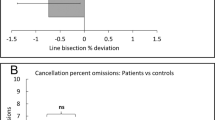Abstract
The effects of the cerebellum on cognitive functions (CF) are poorly known and inadequately studied. Neurological, neuropsychological, and neuroimaging studies were performed on 25 non-random patients (14 female, 11 male, mean age 51.8 ± 18.0 years) with isolated cerebellar infarcts. Cognitive impairments (CI) were seen in 22 patients (88%). These included impairments of attention, planning, control, abstract thought, memory, and speech disturbances (naming difficulties, irregularity of speech, agrammatism, dysprosodia), visuospatial and quasispatial disturbances, and counting impairments, demonstrating dysfunction of the anterior and posterior associative areas of the cortex. The extent of CI varied: 16 patients (64%) showed impairments only in neuropsychological tests, while six (24%) had clinically apparent impairments. Clinically significant CI developed in lesions of particular areas (posteroinferolateral and posteromedial/median) of the cerebellar cortex associated with the dominant hemisphere of the brain. The existence of clinically significant CI was independent of infarct size: infarcts were smaller (mean 5.65 cm3) in patients with marked impairments than in others (mean 12.8 cm3). The typical signs of cerebellar infarcts (ataxia, vertigo, vomiting) were seen in all patients with clinically insignificant and in only two of six patients with clinically significant CI. The present studies demonstrated the involvement of the cerebellum in the modulation of CF. The extent of CI in cerebellar infarcts depended on infarct location. The topical localizations of cerebellar zones controlling CF and movement are different.
Similar content being viewed by others
REFERENCES
L. A. Kalashnikova, “The role of the cerebellum in the organization of higher mental functions,” Zh. Nevrol. Psikhiat., 101, No.4, 55–66 (2001).
L. A. Kalashnikova, A. S. Kadykov, and E. A. Bodareva, “Mutism and other impairments of higher mental functions in lesions of brain circulation in the vertebrobasilar system,” Nevrol. Zh., 2, 9–12 (1997).
L. A. Kalashnikova, A. S. Kadykov, E. M. Kashina, et al., “Impairment of higher brain functions in cerebellar infarcts,” Nevrol. Zh., 5, No.1, 15–21 (2000).
N. A. Akshoomoff and E. Courchesne, “A new role for the cerebellum in cognitive operations,” Behav. Neurosci., 106, 731–738 (1992).
G. Allen, R. B. Buxton, E. C. Wong, and E. Courchesne, “Attentional activation of the cerebellum independent of motor involvement,” Science, 275, 1940–1943 (1997).
A. G. Canavan, R. Sprengelmeyer, H. C. Diener, and V. Homberg, “Conditional associative learning is impaired in cerebellar disease in humans,” Behav. Neurosci., 108, 475–485 (1994).
E. Courchesne, J. Townsend, N. A. Akshoomoff, et al., “Impairment in shifting attention in autistic and cerebellar patients,” Behav. Neurosci., 108, 848–865 (1994).
M. Cole, “The foreign policy of the cerebellum,” Neurology, 44, 2003–2005 (1994).
R. S. Dow, “Cerebellar cognition,” Neurology, 45, 1785–1786 (1995).
J. A. Fiez, S. E. Petersen, M. K. Cheney, and M. E. Raichle, “Impaired non-motor learning and error detection associated with cerebellar damage. A single case study,” Brain, 115, No.1, 155–178 (1992).
L. J. Hudson, B. E. Murdoch, and A. E. Ozanne, “Posterior fossa tumor associated speech and language disorders post-surgery,” Aphasiology, 3, 1–18 (1989).
J. Grafman, I. Litvan, S. Massaquoi, M. Stewart, et al., “Cognitive planning deficit in patients with cerebellar atrophy,” Neurology, 42, 1493–1496 (1992).
H. C. Leiner, A. L. Leiner, and R. S. Dow, “The human cerebro-cerebellar system: its computing, cognitive and language skills,” Behav. Brain Res., 44, 113–128 (1991).
H. C. Leiner, A. L. Leiner, and R. S. Dow, “Cognitive and language functions of the human cerebellum,” Trends. Neurosci., 16, 444–447 (1993).
J. Malm, B. Kristensen, T. Karlsson, et al., “Cognitive impairment in young adults with infratentorial infarcts,” Neurology, 51, 433–440 (1998).
F. A. Middleton and P. L. Stick, “Anatomical evidence for cerebellar and basal ganglia involvement in higher cognitive function,” Science, 266, 458–461 (1994).
P. J. Orioli and P. L. Stick, “Cerebellar connections with the motor cortex and the arcuate premotor area: an analysis employing retrograde transneural transport of WGA-HRP,” J. Comp. Neurol., 288, 612–626 (1989).
S. E. Petersen and J. A. Feiz, “The processing of single words studied with positron emission tomography,” Ann. Rev. Neurosci., 16, 509–530 (1993).
J. Schmahmann, “An emerging concept. The cerebellar contribution to higher function,” Arch. Neurol., 48, 1178–1187 (1991).
J. Schmahmann, “From movement to thought: anatomic substrates of the cerebellar contribution to cognitive processing,” Hum. Brain Mapping, 4, 174–198 (1996).
J. D. Schmahmann and J. C. Sherman, “The cerebellar cognitive affective syndrome,” Brain, 121, 561–579 (1998).
M. C. Silveri, M. G. Leggio, and M. Molinari, “The cerebellum contributes to linguistic production: a case of agrammatic speech following a right cerebellar lesion,” Neurology, 44, 2047–2050 (1994).
The Cerebellum and Cognition, J. Schmahmann (ed.), Academic Press (1997).
H. R. Van Dongen, C. E. Catsman-Berrevoets, and K. van Mouri, “The syndrome of ‘cerebellar’ mutism and subsequent dysarthria,” Neurology, 44, 2040–2046 (1994).
M. Vokaer, J. C. Bier, S. Elincx, et al., “The cerebellum may be directly involved in cognitive functions,” Neurology, 58, 967–970 (2002).
C. W. Wallesch and A. Horn, “Long-term effects of cerebellar pathology on cognitive functions,” Brain Cogn., 14, 19–25 (1990).
L. V. Blumenau, The Human Brain [in Russian], Moscow, Leningrad (1925), pp. 163–184.
A. R. Luriya, Higher Cortical Functions in Humans [in Russian], Moscow (1969).
A. Keller, K. Arissian, and H. Asanuma, “Formation of new synapses in the cat motor cortex following lesions of the deep cerebellar nuclei,” Exptl. Brain Res., 80, 23–33 (1990).
S. G. Kim, K. Ugurbil, and P. L. Strick, “Activation of a cerebellar output nucleus during cognitive processing,” Science, 265, 949–951 (1994).
T. Klingberg, P. Roland, and P. Kawashima, “The neural correlates of the central executive function during working memory — a PET study,” Hum. Brain Mapping, 1,Suppl., 414 (1995).
R. Leblanc, E. Meyer, D. Bub, et al., “Language localization with activation positron emission scanning,” Neurosurg., 31, 369–373 (1992).
Author information
Authors and Affiliations
Additional information
__________
Translated from Zhurnal Nevrologii i Psikhatrii imeni S. S. Korsakova, Insul’t, Supplement issue No. 11, pp. 20–26, 2004.
Rights and permissions
About this article
Cite this article
Kalashnikova, L.A., Zueva, Y.V., Pugacheva, O.V. et al. Cognitive Impairments in Cerebellar Infarcts. Neurosci Behav Physiol 35, 773–779 (2005). https://doi.org/10.1007/s11055-005-0123-0
Issue Date:
DOI: https://doi.org/10.1007/s11055-005-0123-0




